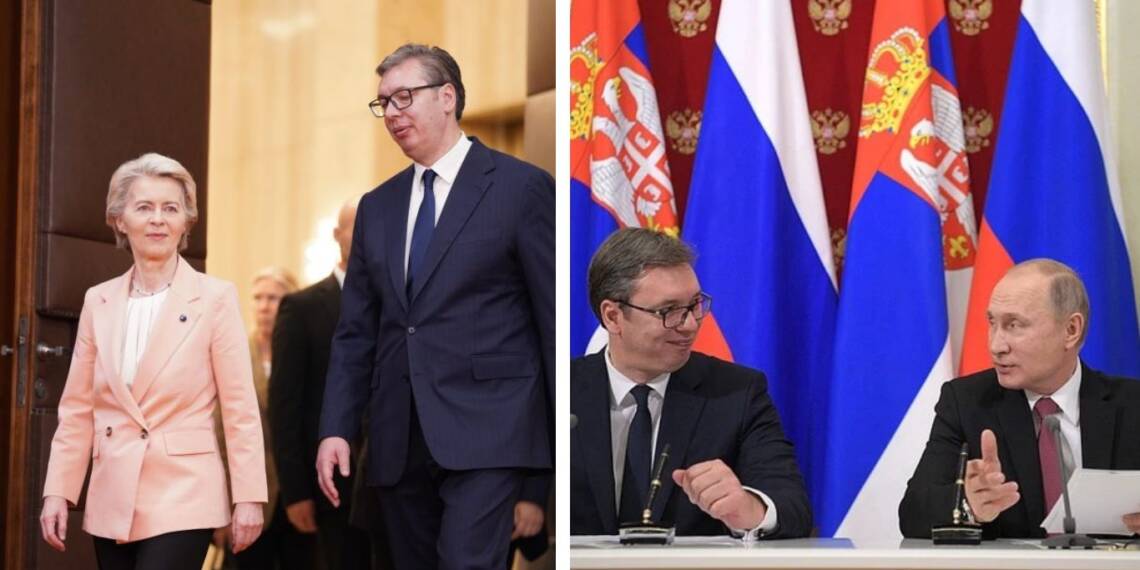If there’s any friendship in the Ukraine war saga that mirrors Lukashenko’s bond with Putin, it’s Serbia President Aleksandar Vučić. He walked a tightrope with Putin, balancing Serbia’s EU ambitions while refusing to sanction Russia—citing Serbia’s own bitter history with sanctions and prioritizing national interests.
He’s also warned that Brussels must brace for war with Russia, claiming the train has already left the station. This has drawn fire from the EU, with critics saying Brussels’ soft approach has only pushed Serbia closer to Russia and China.
But whenever a small nation defies the EU and its power players, pressure follows. Serbia’s feeling the heat, Brussels is grinning, but the accusations are flying around? They’re wild and outrageous.
Mass protests are sweeping Serbia, posing the biggest threat yet to President Aleksandar Vučić’s hold on power.
What started as student outrage over a tragic concrete canopy collapse in Novi Sad, which killed 15 people, has escalated into a nationwide movement against corruption and the erosion of the rule of law. Over the past three months, tens of thousands have marched across 200 cities and towns.
The Bloody Hand
The “bloody hand” has become the defining symbol of the student-led protests. It appears to be a deep social reckoning if you see it from the outside. While students seek systemic change rather than a government overthrow, their movement has united various social groups.
University professors back the students while voicing concerns over academic freedom. Farmers, using tractors to shield student blockades, are demanding better subsidies. Public transport workers, pensioners, and educators have also staged separate demonstrations.
The judiciary—long accused of lacking independence—is also taking a stand. Seventeen high court judges in Belgrade have openly supported the student demands, an unprecedented move. Judges from Niš and Kragujevac have followed suit.
Looks like Vučić’s grip on power is slipping fast. Prime Minister Miloš Vučević just quit, and now the Serbian government is in full-blown crisis mode. Vučić isn’t backing down, though—he’s blaming the protests on “foreign spy agencies” out to get him. He’s thrown out a few minor concessions but is also hinting at using force, saying his supporters are losing patience.
EU Leaves Serbia Burning
But here’s the kicker—the EU doesn’t seem to care. The protests, no matter how massive, aren’t making waves in Brussels. Critics say it’s all about geopolitics and business interests.
The EU’s just sitting back, watching the chaos unfold—and probably enjoying the show.
Vučić’s stance has ruffled feathers in Brussels, Washington, and Kyiv. While Serbia officially remains on the EU path, Vučić’s actions tell a different story. He’s strengthened military ties with Russia, expanded economic cooperation with China, and openly criticized Western hypocrisy on sovereignty and intervention. Hosting peace talks led by Trump? That’s a direct challenge to NATO’s narrative.
But this balancing act isn’t easy. Western pressure is mounting, and recent mass protests have added fuel to the fire. Critics claim Serbia’s unrest is no coincidence—whenever a leader defies the EU, trouble follows.
Now, with Serbia at a crossroads, Vučić’s grip on power is being tested like never before. Is this a democratic uprising or a Western-backed shake-up? Feels suspicious, doesn’t it? However, the truth is no one knows as of now, but whatever happens, it will surely trigger a new chapter in Balkans, a chapter which can be either prosperous, or destructive like never before.








